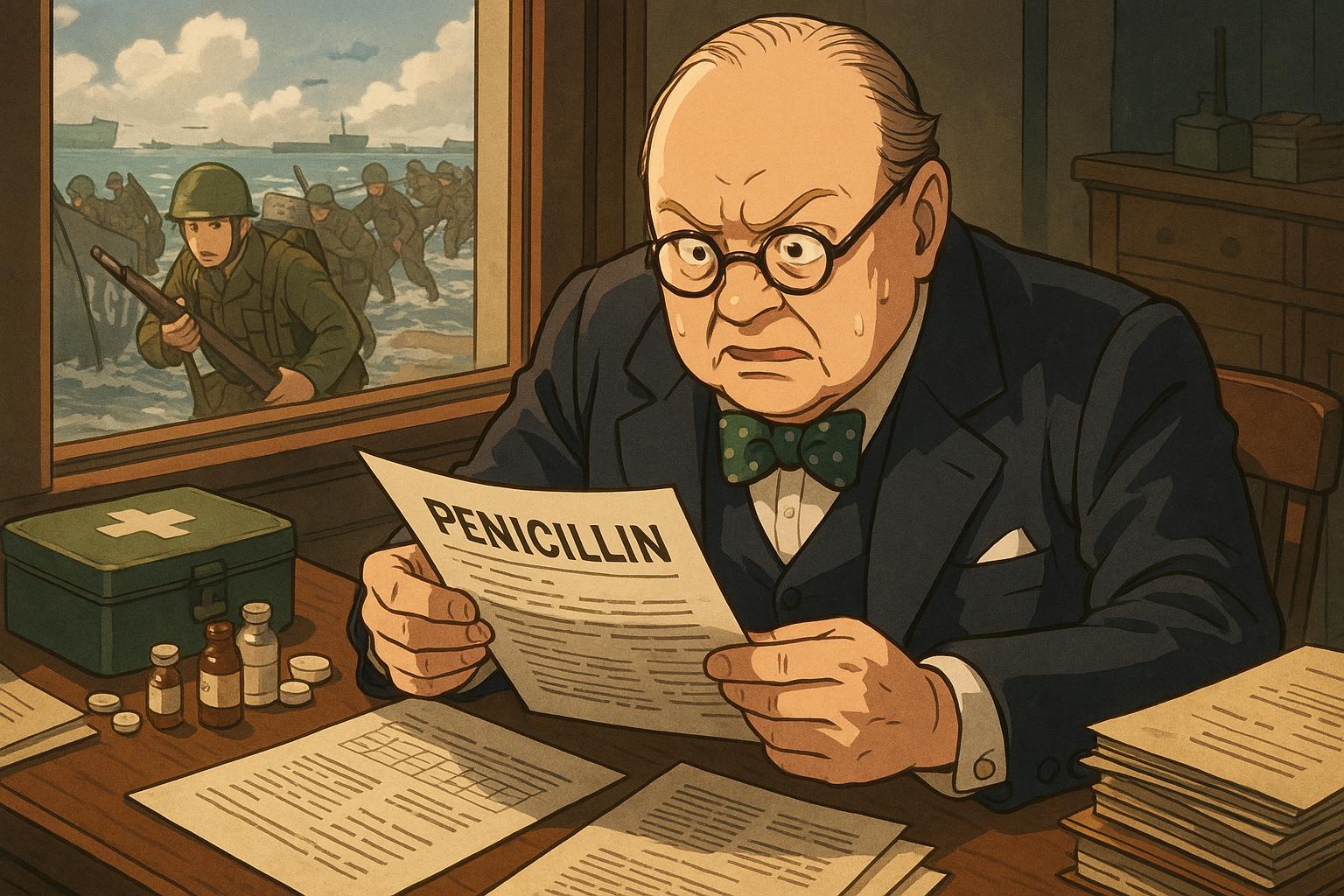Declassified documents reveal Prime Minister Winston Churchill’s frustration over the slow UK production of penicillin ahead of the Normandy invasion, highlighting the crucial role of medical logistics in wartime success.
Documents recently unveiled by the National Archives have shed light on Prime Minister Winston Churchill’s urgent push for penicillin ahead of the D-Day landings in June 1944. The papers reveal Churchill’s growing frustration with the slow progress in securing supplies of what was regarded as a groundbreaking antibiotic. This insight comes as the 79th anniversary of the Normandy Invasion approaches, a pivotal moment in World War II that necessitated extensive logistical and medical preparations due to the heavy casualties expected.
Winston Churchill’s concerns highlight a critical aspect of wartime medicine. Despite penicillin’s initial discovery by Professor Alexander Fleming in 1928, the UK struggled to produce it at the scale necessary for military use. While Oxford researchers, led by Howard Florey, conducted the first successful trials, the production capacity proved inadequate, pushing researchers to the United States, where pharmaceutical companies significantly ramped up production. Churchill noted in a red ink scrawl: “I am sorry we can’t produce more,” after being informed that the Americans were far ahead in producing the medicine. His dissatisfaction is evident in several reports he reviewed, culminating in a particular remark that the projected output for Britain was “very disappointing.”
As Allied forces braced for the monumental invasion, the requirement for penicillin became all the more pressing. Early in 1944, Churchill’s discontent over the UK’s capabilities resonated through his communications with officials, prompting him to demand proposals for increased production. Just weeks before D-Day, officials reported that adequate supplies had finally been secured, mostly from the US, but they would only be allocated for military injuries, underscoring the ongoing challenge of distribution and prioritisation amid wartime constraints.
The context surrounding D-Day reveals the herculean measures taken to prepare for this significant military operation. Allied leaders, including Franklin Roosevelt and Churchill, were acutely aware of the medical needs that would arise from the anticipated bloodshed. The urgency was compounded by the earlier tragic cases where soldiers suffered fatal infections from untreated wounds—conditions that penicillin was expected to alleviate.
However, despite these efforts, civilian access to penicillin would take longer—only becoming available to the general public in 1946. The archives also contained poignant personal correspondence, including a telegram from a doctor in Cornwall desperately requesting penicillin for a 10-year-old child. This plea was met with disappointment; supplies were strictly reserved for military casualties, illustrating the stark realities of resource allocation during wartime.
Historical narratives around Churchill often intertwine with myths, particularly concerning his personal health and the role of penicillin. Despite popular lore, Churchill was not treated with penicillin during a severe illness in 1943; instead, he received sulphonamide. This misinformation persists, showcasing the complex interplay between historical fact and the myths that endure.
As we reflect on D-Day and its legacy, the newly revealed documents provide essential context not only for understanding the logistical challenges faced by the Allies but also for recognising the innovative spirit that emerged under the pressure of war. The need for advanced medical solutions like penicillin highlights the transformative impact of science during conflict—a narrative that resonates even today as we navigate public health challenges.
 Reference Map:
Reference Map:
Source: Noah Wire Services
- https://www.bbc.com/news/articles/cj09v52l8v4o – Please view link – unable to able to access data
- https://www.archives.gov/education/lessons/d-day – This resource from the National Archives provides comprehensive background information on D-Day, detailing the planning and execution of the Allied invasion of Normandy. It discusses the strategic decisions made by leaders like Roosevelt and Churchill, the challenges faced during the operation, and the significance of the event in the context of World War II. The page also includes links to related documents and exhibits, offering a deeper understanding of the historical importance of D-Day.
- https://www.archives.gov/press/press-releases/2014/nr14-76.html – This press release from the National Archives highlights the 70th anniversary of D-Day, showcasing exhibits and resources related to the event. It features a recreation of FDR’s secret White House Map Room, where he monitored reports during the invasion. The release also mentions the D-Day Prayer audio recording and additional online resources from the FDR Library, providing insights into the planning and execution of the Normandy invasion.
- https://winstonchurchill.org/resources/myths/sir-alexander-fleming-twice-saved-churchills-life/ – This article from the International Churchill Society debunks the myth that Sir Alexander Fleming saved Winston Churchill’s life. It traces the origins of the story, noting its first appearance in a 1944 magazine, and provides evidence that Churchill was treated with sulphonamide, not penicillin, during his illness in 1943. The piece also references statements from Churchill’s biographer, Sir Martin Gilbert, and the Churchill Archives Centre, confirming the falsehood of the tale.
- https://www.snopes.com/fact-check/what-goes-around/ – This Snopes article investigates the claim that Alexander Fleming’s father saved Winston Churchill from drowning, leading to Fleming’s discovery of penicillin. It presents evidence that the story is a fabrication, including the lack of any near-drowning incident involving Churchill and the fact that he was treated with sulphonamide, not penicillin, during his illness in 1943. The article also notes that Churchill publicly denied the Fleming story in 1946.
- https://www.churchillarchive.com/d-day-fdr-and-churchill-mighty-endeavor – This collection of documents from the Churchill Archive Platform provides insights into the relationship between Britain and the United States during World War II, focusing on D-Day. It includes personal correspondence, speeches, and secret memoranda between leaders like Roosevelt and Churchill, detailing their plans for a joint offensive on the western front and the steps taken to execute Operation Overlord.
- https://www.historynet.com/penicillin-wonder-drug-world-war-ii/ – This article from HistoryNet explores the role of penicillin during World War II, highlighting its impact on treating infections among soldiers. It discusses the development and mass production of penicillin, its use in the military, and the challenges faced in its distribution. The piece also addresses the myth that penicillin was used to treat Winston Churchill’s pneumonia, clarifying that he was actually treated with sulphonamide.













